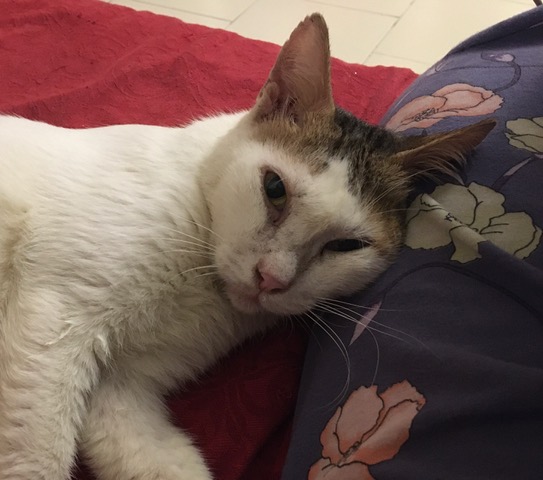Ode to an Ugly Cat

Idly is not a beautiful cat. There is something about the way he looks at you that will set you on edge and it will take you a long time to get over this feeling. The edges of his ears are jagged, a little bit frayed. Old cat ears. He has scratches on his nose. He always has something sticking to his whiskers and there is nothing you can do about that. He would rather have cat litter stuck to his face than let you near him with a tissue.
Idly is not exactly dirty but he is by no means clean. His paws are a mess, suspicious dark substances cake the spaces beneath his claws. When he yawns, his breath is hot and terrible. He drools constantly. One day, a single yellow tooth falls out and is found lying on a blue pillow.
There seems to be so much to overcome, before you can begin to love this prickly cat.
Once I coughed while I was feeding Idly and when I look down, he is gone. I find him hiding behind the sofa and try as I might, he will not come out. Another evening I sneeze and he is gone again. One humid June night as we sit together on the sofa, like people waiting for the same bus, my left slipper slips off of my foot and down to the floor and now Idly is gone and no amount of coaxing will make him return.
I think of the amount of fear that fills Idly’s 3.7 kilo body and it makes me sad. I think of all the fat cats in my living room who react to nothing—the doorbell, the whistles of the pressure cooker, the vacuum cleaner tracing the outlines of their soft, content bodies. Everything slips harmlessly off of them, nothing hurts, no offense is taken. They are curious and sleepy and nothing else in between.
During the first weeks of Idly living here, he hissed at me incessantly. This was hard for me, an already over-sensitive lady who, and I say this knowing how pompous this sounds, has rarely met cats who did not like her.
I would walk into Idly’s room, calling his name out sweetly and he would crouch down in his cage and tell me how much he hated me and this world and all the pain that was coursing through his body. There was a desperation in his voice, in the way he held himself. In this empty room, he was ready to fight for his life.
I found it hard in those early days to clean Idly’s wound. It was large and hard to look at. I had to brace myself each time. I held my breath and fumbled badly with the cotton pads, the silicone gel. I thought, I cannot do this, it’s too difficult. I watch my husband as he cleans the wound cheerfully, applies the lotion as if it is nothing. He does not hesitate. He reminds me that bandages and scabs were so much part of his childhood. He reminds me of how he missed a whole year of school, how he still loves the smell of hospitals, how he collected glass syringes as a little boy who could not walk. And keeping all these things in mind, as this hot, difficult month goes by, I get better at this. The wound shrinks and we, the old cat and I, grow unafraid of each other.
I sing songs to Idly and make terrible puns about his name and he looks up at me with something that is not panic. He lets me pet him and pushes his little body against me as we sit together, his half-shaved tail across my lap.
After six weeks, we take Idly to see Dr Priya and she is delighted with the way his wound has healed and she calls her two interns to come and marvel at this miracle of regrown flesh. The interns murmur with approval as the one with the streak of beautiful blue in her hair takes pictures.
Idly hates all of this. He hated the car ride here, the indignity of the cat carrier, he hated the waiting area of Dr Priya’s garden, filled as it was with a large number of a wide variety of dogs. He hated being weighed, he hated the injection. He yowls angrily all the way back home and throughout the short elevator ride up to our apartment.
I quickly take him to what is now his room and place him on the floor but instead of running to hide behind the sofa, Idly jumps up on the sofa, waits for me to sit next to him and then climbs onto my lap. He purrs like a wheezy old man and I feel like a crown has been placed upon my head.

Snigdha Manickavel was born and raised in Canada, then transplanted into a small town in south India. She is a gold medalist from Madras University and has experience working in the social sector. She is the author of A Silent Revolution: The Journey of the Srinivasan Services Trust. Her work has been published in Parabola, National Geographic Traveller, Open, The Indian Express, and The Hindu BusinessLine. She lives in Chennai. Photo credits: Snigdha Manickavel
SHARE YOUR REFLECTION
13 Past Reflections


On Jul 25, 2023 plsctierney@sti.net wrote:



On Jul 19, 2023 Paula wrote:
1 reply: Noël | Post Your Reply


On Jul 19, 2023 Sandra wrote:

On Jul 19, 2023 Merrikate St.Kitts wrote:

On Jul 19, 2023 Freda wrote:

On Jul 19, 2023 Cassandra wrote:
2 replies: Elayne, Elayne | Post Your Reply

On Jul 19, 2023 Sulima wrote:

On Jul 19, 2023 Vaishakhi wrote:


On Aug 12, 2023 melaniedeason54@gmail.com wrote:
Post Your Reply